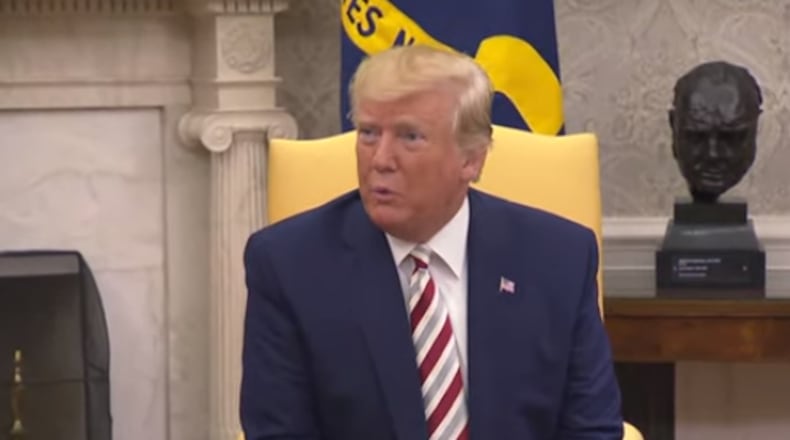"Starting on October 1st, the 250 BILLION DOLLARS of goods and products from China, currently being taxed at 25%, will be taxed at 30%," the President wrote.
"Additionally, the remaining 300 BILLION DOLLARS of goods and products from China, that was being taxed from September 1st at 10%, will now be taxed at 15%," he added.
...unfair Trading Relationship. China should not have put new Tariffs on 75 BILLION DOLLARS of United States product (politically motivated!). Starting on October 1st, the 250 BILLION DOLLARS of goods and products from China, currently being taxed at 25%, will be taxed at 30%...
— Donald J. Trump (@realDonaldTrump) August 23, 2019
...Additionally, the remaining 300 BILLION DOLLARS of goods and products from China, that was being taxed from September 1st at 10%, will now be taxed at 15%. Thank you for your attention to this matter!
— Donald J. Trump (@realDonaldTrump) August 23, 2019
The President also called on American companies to take their manufacturing businesses out of China, arguing that the United States was the victim of an 'unfair Trading Relationship.'
"Our great American companies are hereby ordered to immediately start looking for an alternative to China, including bringing your companies HOME and making your products in the USA," Mr. Trump tweeted.
The White House did not provide any explanation as to how the President would have the power to force U.S. companies to abandon their manufacturing operations in China.
Economic experts and businesses were worried by the days events.
“(T)his is a major risk as it's the economy - households and businesses - that are in play,” said Gregory Daco of Oxford Economics.
“The administration's approach clearly isn't working, and the answer isn't more taxes on American businesses and consumers,” said the National Retail Federation. “Where does this end?"
“These added tariffs will ratchet up consumer prices, stall business investment, escalate uncertainty and cost American jobs,” said the pro-free trade group Tariffs Hurt the Heartland.
“In just the past three years, U.S. soybean exports to China have fallen nearly 80 percent, and once these tariffs kick in, things are likely to get worse,” said Roger Johnson, the head of the National Farmers Union.
The standoff with China was a far cry from President Trump's prediction in March of 2018, when he wrote on Twitter that trade wars are 'easy to win.'
As for Democrats - even though many of them would like to see the United States be more forceful with China - their answer is not retaliatory tariffs and a trade war.
“Our economy is showing signs of weakening due to the president’s trade war, and these back-and-forth tariffs will only make things worse,” said Sen. Dianne Feinstein (D-CA).
“The facts are clear: President Trump's destabilizing and reckless trade war is undermining growth,” said Rep. Alan Lowenthal (D-CA).
.@POTUS's trade policies are hurting our economy and do not put our best interests first. Rather than further isolating the US, we should be working with our traditional trade partners to develop a strategy to confront China. pic.twitter.com/PBEx49IKV7
— Senator Ben Cardin (@SenatorCardin) August 23, 2019
“Your tariffs are hurting our country badly,” said Rep. Don Beyer (D-VA).
“There's nothing funny about tanking people's retirement accounts with a failed trade war,” said Sen. Mark Warner (D-VA).
About the Author


